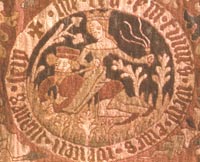|
|
|
|||||||
|
The poet expresses his regret for slandering women in the past; although Eve, who brought about the downfall of humanity, was a woman, so was the Virgin Mary, who as mother of Christ brought about its salvation. His claim that since the birth of Christ no woman has been wicked, however, seems disingenous; and his final address to 'Richard', whose example he claims to be following, implies that the linking of women with the Virgin in his poetry is less a matter of moral conviction than a rhetorical strategy to attract their favours. 'Richard' has not been identified, and is unlikely to be (unless he is the suggested compiler of Oxford, Bodleian Library, MS Digby 86, Richard de Grimhill (c. 1263---c. 1308)? The poem has some thematic similarities to the debate-poem The Thrush and the Nightingale, whose earliest surviving text is in Digby 86; see the Introduction to The Thrush and the Nightingale. But 'Richard' was a very common name in this period).
|
|||||||
|
|
|
|||||||
| Set up by Bella Millett, enm@soton.ac.uk. Last updated 31 July 2003 . |
 The
language of this poem is difficult---a difficulty related to its intricate
form. The twelve-line stanzas are made up of eight four-stress lines
rhyming abababab, followed by four three-stress lines rhyming cdcd;
the poet also uses heavy alliteration, often running for more than a
single line, and there is concatenation (by echoing of word-forms) both
between the eighth and ninth line of each stanza and between stanzas.
The
language of this poem is difficult---a difficulty related to its intricate
form. The twelve-line stanzas are made up of eight four-stress lines
rhyming abababab, followed by four three-stress lines rhyming cdcd;
the poet also uses heavy alliteration, often running for more than a
single line, and there is concatenation (by echoing of word-forms) both
between the eighth and ninth line of each stanza and between stanzas.